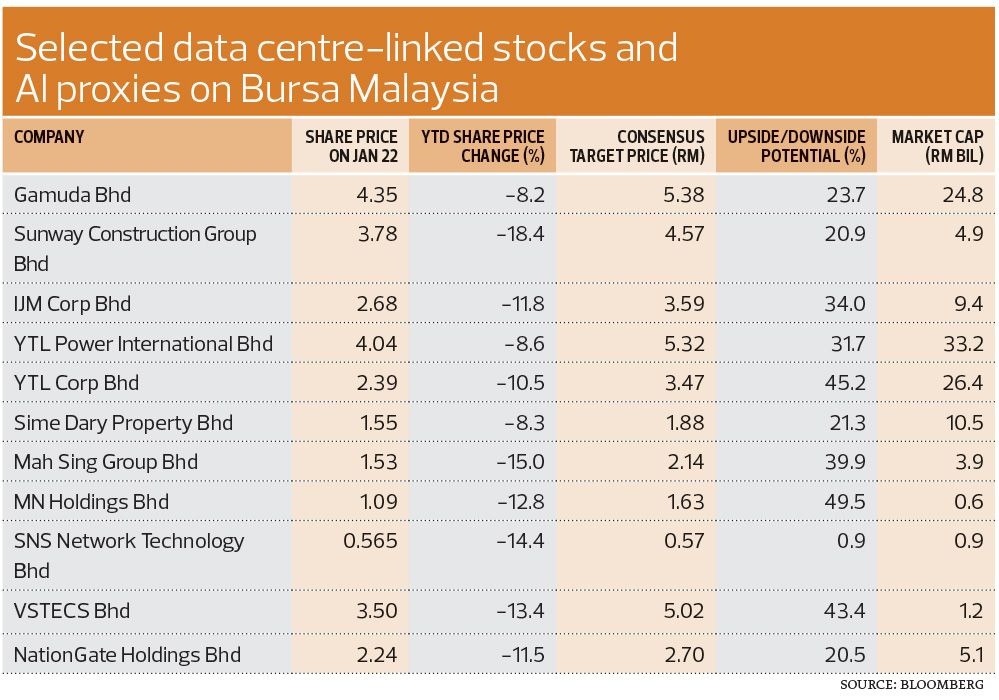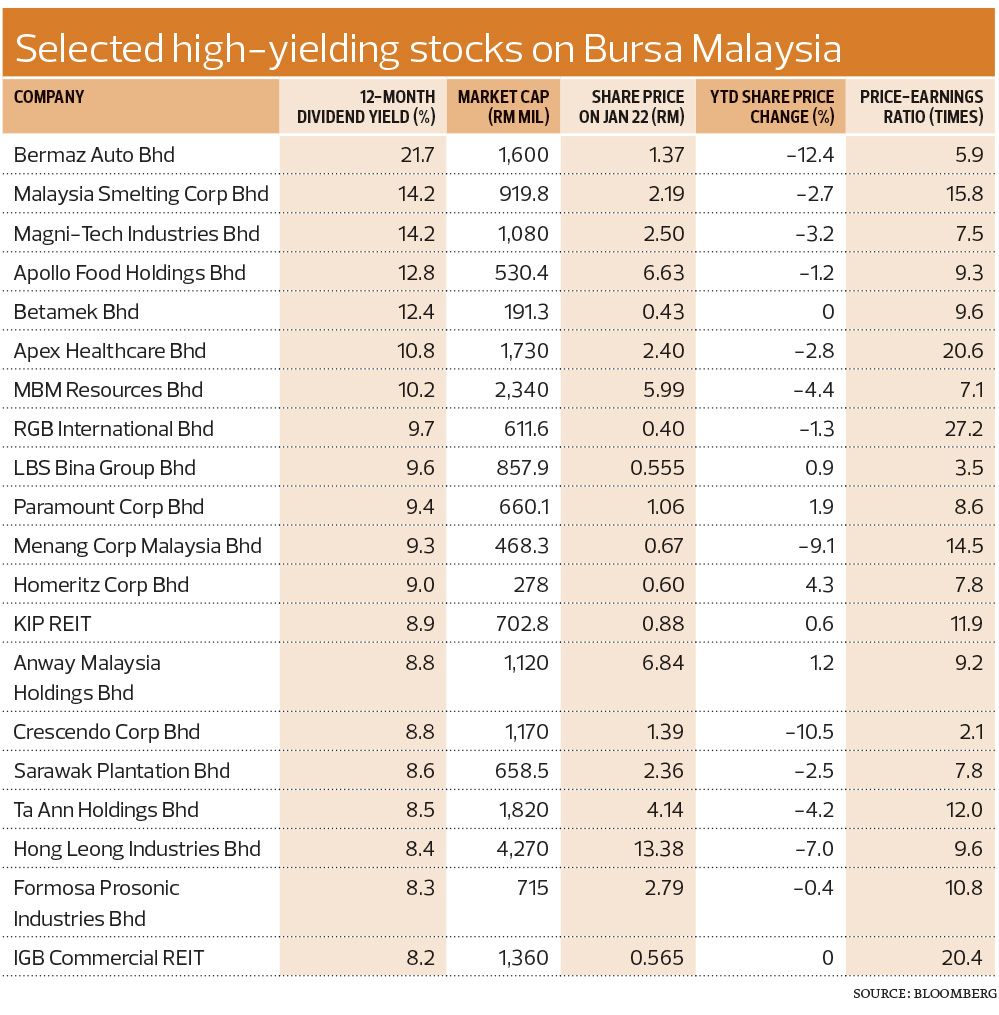This article first appeared in Capital, The Edge Malaysia Weekly on January 27, 2025 - February 2, 2025
OPTIMISM that recently announced US tariffs will be implemented in a more gradual manner gave some support last week to data centre and artificial intelligence (AI) linked stocks on Bursa Malaysia following a bout of heavy selling after former US president Joe Biden announced AI chip export curbs on Jan 13.
But is the relief temporary or can the support hold? Analysts are mixed on what lies ahead, but agree that greater clarity on the new restrictions and policies will aid investment decisions.
Year to date, the share prices of most data centre-linked stocks and AI proxies are still down, led by Sunway Construction Group Bhd (KL:SUNCON) (-18.4%), Mah Sing Group Bhd (KL:MAHSING) (-15%) and SNS Network Technology Bhd (KL:SNS) (-14.4%).
Against their consensus target prices, the data centre-linked stocks and AI proxies still offer quite decent returns, with the biggest upside potential for MN Holdings Bhd (KL:MNHLDG) at 49.5%, whileYTL Corp Bhd (KL:YTL), Mah Sing and IJM Corp Bhd (KL:IJM) are at 45.2%, 39.9% and 34% respectively.
Kenanga Research head Peter Kong expects bottom fishing in data centre-linked stocks and AI proxies to continue as some stocks have seen their price-earnings ratios (PER) hitting pre-data centre boom levels following the recent sell-off.
However, he thinks that for the stocks to exceed previous highs, it may require some policy clarity on the implementation as the current AI diffusion rules do not offer longer-term clarity.
Kong notes that selected data centre segments, such as contractors, could see more value emerging, followed by the GPU-as-a-service play, given that they may be able to obtain chips via the national validated end user (NVEU) status.
“But we see more risk in server manufacturers, given the updated controls under the AI diffusion IFR (interim final rule),” he tells The Edge.
He is of the view that stocks like Sime Darby Property Bhd (KL:SIMEPROP), which has locked in off-takers under the build-and-lease model, has been undeservedly sold down. Similarly, he thinks construction names like IJM have suffered the same fate even though it has a relatively smaller existing data centre order book exposure.
Danny Wong, CEO of Areca Capital Sdn Bhd, opines that oversold data centre-related counters may present buying opportunities.
“Having studied the details, investors realised that not every data centre-related stock will be affected, and some were oversold because of their exposure in AI chips. Some are not affected as they are only service providers.”
Despite the potential headwinds, Wong continues to prefer well-diversified construction stocks such as Gamuda Bhd (KL:GAMUDA), which is exposed to data centre development but also has huge infrastructure jobs with a presence in several countries.
However, Wong cautions that the Trump administration is poised to add more uncertainties as US President Donald Trump has revoked nearly 80 executive orders signed by the Biden administration.
“Whenever there’s a change of president in the US, the new president will reverse whatever that was made before to show disagreement and to honour promises during the presidential campaign. It will be bringing more uncertainties in the next two to three months,” he says.
Victor Wan, head of research at Inter-Pacific Securities Sdn Bhd, foresees the market remaining volatile and unpredictable, though there has been bargain hunting in data centre-linked stocks and AI proxies.
“Value has emerged somewhat after the sell-off, but [there is] no policy clarity yet from the US.
Investors have to be a bit more cautious at this point. Some of the stocks have taken a deep dive of late, so I think just buy back for the time being. But of course, be prepared to cut losses or sell when things turn [bad] against the sector. There’s actually no one strategy for it because if things are uncertain, how can you actually put your money in there for the long term?” he says.
Ang Kok Heng, chief investment officer at Phillip Capital, believes the big trend of data centres will continue on the back of increasing market demand. “I think US chip restrictions are temporary.”
At the same time, local companies are confident that they will not be affected by the proposed US rules on advanced chip exports. For example, YTL Power International Bhd (KL:YTLPOWR) has said that its customer pipeline for its data centres remains intact. The company is in the process of setting up its own AI-powered data centres using the latest chips by US chip giant Nvidia Corp.
And MIDF Research says its meeting with Sunway Construction’s management has reaffirmed its belief that the recent sell-off in data centre-related construction stocks may have been overdone. According to Sunway Construction, none of its clients — data centre owners from the US, the Netherlands and Singapore — has expressed any adverse feedback on the restrictions on exports of AI chips.
Hong Leong Investment Bank Research is keeping “buy” calls on most of the data centre-linked stocks after their share prices took a dive, though target prices for selected construction names have been lowered.
Despite the recent restrictions denting the prospects of Malaysia’s data centre market, the research house takes solace from the fact that 91% of the US$23.3 billion (RM103.4 billion) in major investments announced over the past year came from global tech giants that are headquartered in the US. It is of the view that this could likely enable the tech giants to obtain universal verified end user (UVEU) status, allowing them to import graphics processing units (GPUs) for their Malaysia-based AI data centres.
As it is, the new framework announced by the Biden administration would curb Nvidia’s AI chip exports, which command more than 80% of the global market share. The move is aimed at retaining the US’ dominant status in AI by controlling supply markets, as well as preventing China from accessing AI chips to build frontier models.
Soon after Trump returned to office last Monday, as US president for a second and final term, he promised a “golden age” for the US. Without immediately imposing tariffs, Trump said he was thinking of a 25% tariff on goods from Mexico and Canada effective Feb 1 because of their border policies, Bloomberg reported.
At the same time, he temporarily halted a ban on TikTok in the US, granting the company and its Chinese parent ByteDance Ltd more time to reach a deal for the popular app that would resolve long-standing US national security concerns.
And then last Wednesday, Trump vowed to hit the European Union with tariffs and said his administration was discussing a 10% punitive duty on Chinese imports because fentanyl is being sent from China to the US via Mexico and Canada. He had previously threatened a 10% duty on Chinese imports because of the trade, but realigned that with the Feb 1 deadline.
Assessing the implications of Trump’s remarks, UOB Global Economics & Markets Research stresses that a delay does not imply no tariffs.
“We maintain our base-case scenario (55%) for more measured imposition of tariffs (additional 25% tariff on China, instead of the claimed 60%, 10% tariffs on economies that recorded an increase in trade surplus with the US due to trade diversion from China, and no blanket tariff on all US imports), with a staggered implementation pace from as early as 2Q2025 and fully completed by 1H2026,” it says in a Jan 21 note.
PublicInvest Research foresees little chance that the Trump administration will fully overturn the decision to impose restrictions on AI chip exports.
Kenanga’s Kong concurs, noting that the US wants to control the technology flows, but he expects robust discussions with stakeholders, including big tech players, in the next 120 days to achieve a balance between growing AI infrastructure in the US and outside of the US, which could be more economical for big tech as well as viable for various reasons, including power.
Save by subscribing to us for your print and/or digital copy.
P/S: The Edge is also available on Apple's App Store and Android's Google Play.
- Massive gas pipeline fire in Puchong — Fire Dept
- Fire incident in Putra Heights not related to Gas Malaysia facilities, company says
- Petronas confirms fire incident at Petronas Gas main pipeline near Puchong
- Gas pipeline blaze: 25 receiving initial medical treatment as of 10.35am
- Gas pipeline blaze: Fire Dept evacuating nearby residents
- Insider Moves: Kanger International Bhd, HHRG Bhd, EG Industries Bhd, T7 Global Bhd, Sin Heng Chan (Malaya) Bhd
- Sale of KFC back on the menu?
- Gas pipeline blaze: Environment Dept to monitor air quality
- Gas pipeline blaze victims recount earthquake-like tremors
- Trump to unveil country-based tariffs on April 2 at White House Rose Garden



